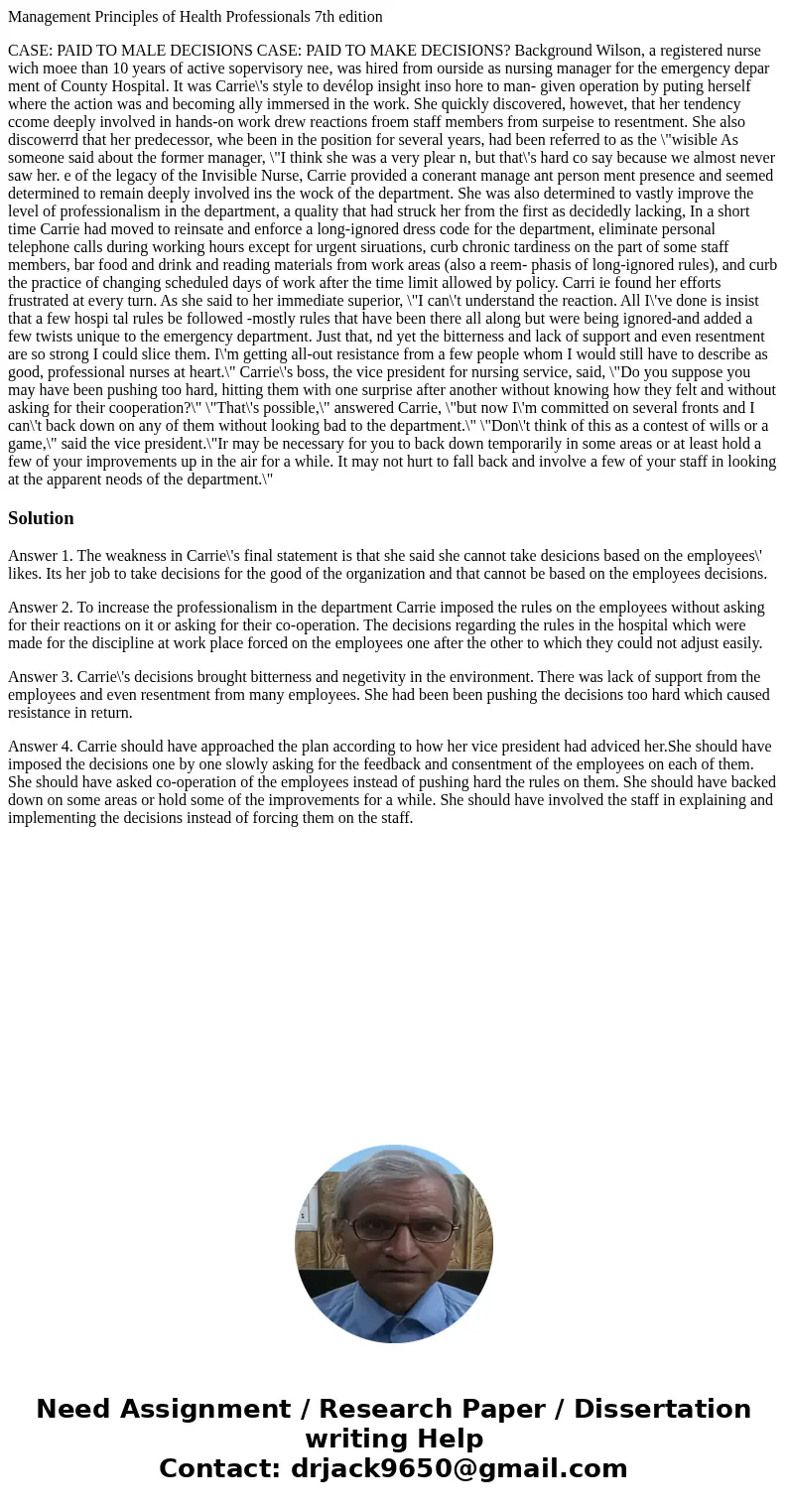Management Principles of Health Professionals 7th edition CA
Management Principles of Health Professionals 7th edition
CASE: PAID TO MALE DECISIONS CASE: PAID TO MAKE DECISIONS? Background Wilson, a registered nurse wich moee than 10 years of active sopervisory nee, was hired from ourside as nursing manager for the emergency depar ment of County Hospital. It was Carrie\'s style to devélop insight inso hore to man- given operation by puting herself where the action was and becoming ally immersed in the work. She quickly discovered, howevet, that her tendency ccome deeply involved in hands-on work drew reactions froem staff members from surpeise to resentment. She also discowerrd that her predecessor, whe been in the position for several years, had been referred to as the \"wisible As someone said about the former manager, \"I think she was a very plear n, but that\'s hard co say because we almost never saw her. e of the legacy of the Invisible Nurse, Carrie provided a conerant manage ant person ment presence and seemed determined to remain deeply involved ins the wock of the department. She was also determined to vastly improve the level of professionalism in the department, a quality that had struck her from the first as decidedly lacking, In a short time Carrie had moved to reinsate and enforce a long-ignored dress code for the department, eliminate personal telephone calls during working hours except for urgent siruations, curb chronic tardiness on the part of some staff members, bar food and drink and reading materials from work areas (also a reem- phasis of long-ignored rules), and curb the practice of changing scheduled days of work after the time limit allowed by policy. Carri ie found her efforts frustrated at every turn. As she said to her immediate superior, \"I can\'t understand the reaction. All I\'ve done is insist that a few hospi tal rules be followed -mostly rules that have been there all along but were being ignored-and added a few twists unique to the emergency department. Just that, nd yet the bitterness and lack of support and even resentment are so strong I could slice them. I\'m getting all-out resistance from a few people whom I would still have to describe as good, professional nurses at heart.\" Carrie\'s boss, the vice president for nursing service, said, \"Do you suppose you may have been pushing too hard, hitting them with one surprise after another without knowing how they felt and without asking for their cooperation?\" \"That\'s possible,\" answered Carrie, \"but now I\'m committed on several fronts and I can\'t back down on any of them without looking bad to the department.\" \"Don\'t think of this as a contest of wills or a game,\" said the vice president.\"Ir may be necessary for you to back down temporarily in some areas or at least hold a few of your improvements up in the air for a while. It may not hurt to fall back and involve a few of your staff in looking at the apparent neods of the department.\"Solution
Answer 1. The weakness in Carrie\'s final statement is that she said she cannot take desicions based on the employees\' likes. Its her job to take decisions for the good of the organization and that cannot be based on the employees decisions.
Answer 2. To increase the professionalism in the department Carrie imposed the rules on the employees without asking for their reactions on it or asking for their co-operation. The decisions regarding the rules in the hospital which were made for the discipline at work place forced on the employees one after the other to which they could not adjust easily.
Answer 3. Carrie\'s decisions brought bitterness and negetivity in the environment. There was lack of support from the employees and even resentment from many employees. She had been been pushing the decisions too hard which caused resistance in return.
Answer 4. Carrie should have approached the plan according to how her vice president had adviced her.She should have imposed the decisions one by one slowly asking for the feedback and consentment of the employees on each of them. She should have asked co-operation of the employees instead of pushing hard the rules on them. She should have backed down on some areas or hold some of the improvements for a while. She should have involved the staff in explaining and implementing the decisions instead of forcing them on the staff.

 Homework Sourse
Homework Sourse